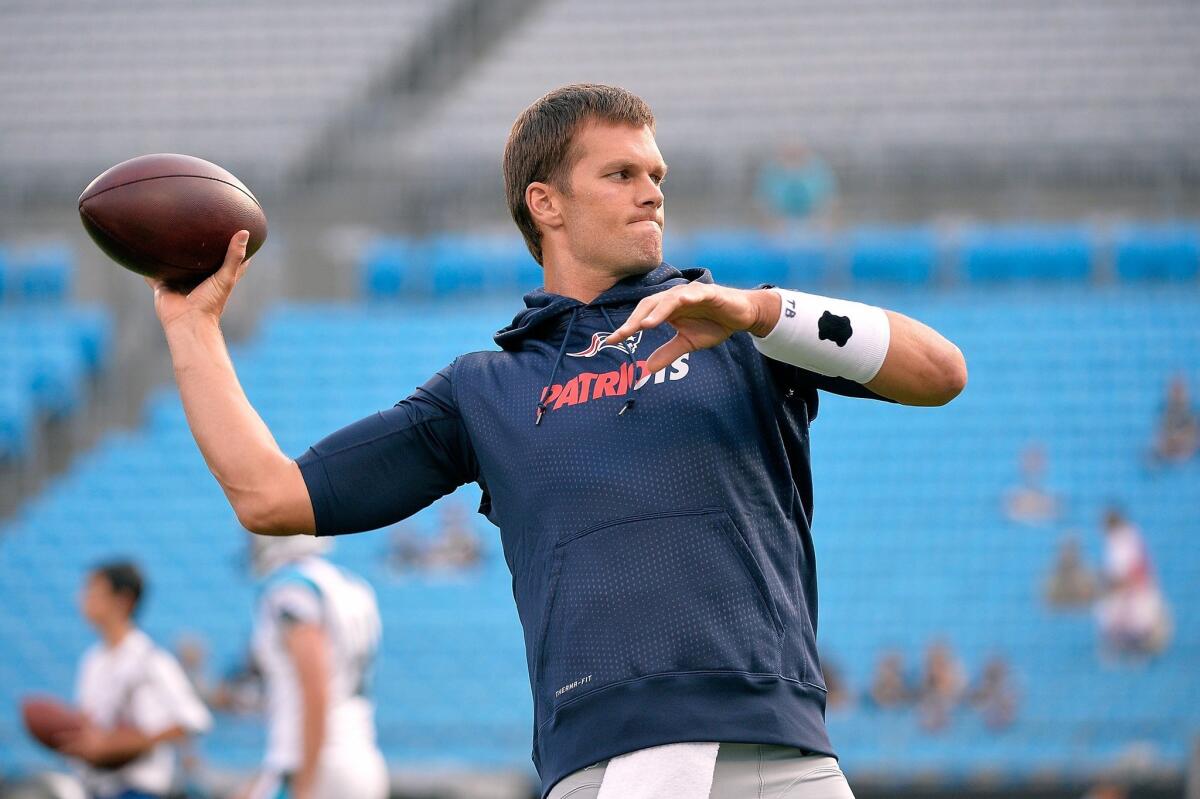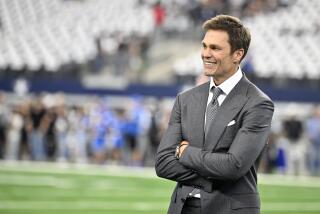ESPN’s bad call on deflategate shows why pundits shouldn’t make predictions

Tom Brady throws ESPN’s Lester Munson for a big loss.
- Share via
Predictions are the mother’s milk of sportswriting -- heck, they’re the mother’s milk of all punditry. Perhaps it’s unfair to pick on one spectacularly wrong prediction among so many, but it’s hard to resist the unbelievably bad call made just over a month ago by ESPN’s “legal analyst” Lester Munson about New England Patriot quarterback Tom Brady’s Deflategate appeal. (H/T to Scott Lemieux.)
With absolute cocksureness, Munson predicted on July 28 that Brady’s appeal of the four-game suspension laid on him by NFL Commissioner Roger Goodell was doomed, dead, defunct:
“Question: Will Brady succeed in court and stop the NFL from suspending him for four games?
“Answer: No, Brady will not succeed. Although he enjoys top-of-the-line legal representation and his lawyers will file a brilliantly written lawsuit, his effort to stop the suspension is doomed.... Goodell produced a decision on Brady that is brilliantly reasoned, meticulously detailed, and well-written. Goodell’s recitation of the evidence of the tampering with game balls is powerful, and his description of Brady’s attempt at a cover-up is persuasive.”
Munson observed that federal judges are very reluctant to overturn arbitrators’ decisions unless there’s darned good reason. Sure, he wrote, a federal judge in Minneapolis had overturned the punishment of Vikings running back Adrian Peterson in a child abuse case, but that was special and the NFL would probably win on appeal.
As we all know today, every bit of this turned out to be wrong. In a 40-page decision, federal Judge Richard M. Berman of New York on Thursday overturned Brady’s suspension and blew Goodell’s reasoning and indeed the NFL’s entire player disciplinary system to smithereens.
Judge Berman found Goodell’s supposedly “brilliantly reasoned” decision to be full of “legal deficiencies” and his reasoning “legally misplaced,” and his conduct of the arbitration procedure “fundamentally unfair” to Brady.
He found some of Goodell’s arguments to be flatly absurd, especially the commissioner’s attempt to link Brady’s four-game suspension to the league’s steroid abuse policy. Steroid use, Berman found, involves “a number of physiological, psychological, orthopedic, reproductive, and other serious health problems [such as] heart disease, liver cancer, musculoskeletal growth defects, strokes, and infertility.... None of these factors is (remotely) present here.”
The case at hand, he noted, involves whether Brady knew that game balls were being inflated to pressures below league standards. The only punishment in the NFL rules for equipment infractions is a fine of $5,512. That’s the only penalty for which Brady had any notice, and the charge against him didn’t even involve his own deflating of the balls, but being “generally aware” that it was being done (a violation Berman considered too nebulous to fairly warrant punishment).
As for the Peterson reversal, not only did Berman consider it an outlier, he cited it in support of his own ruling.
The downside of making predictions that easily can be confounded by events is something I learned about early in my career, when I covered New York state politics. I wrote of the upcoming 1978 state elections that, with the recent retirements of the superannuated Atty. Gen. Louis Lefkowitz and state Controller Arthur Levitt, the only sure thing about the Democratic ticket was that Gov. Hugh Carey and Lt. Gov. Mary Anne Krupsak would be running for reelection together.
A few days later, Krupsak bailed out, cursed Carey as a horrible human being, and ran for the gubernatorial nomination herself. (She got creamed.) The lesson I learned was that a journalist should never make predictions, at least none that people can remember.
The exceptions, of course, are predictions about the stock market (no one ever expects those to come true) and pro sports games (no one takes them seriously). Munson’s mistake was making a prediction about a lawsuit, when he thought he was making a prediction about sports. Here’s guessing he won’t do that again.
Keep up to date with the Economy Hub. Follow @hiltzikm on Twitter, see our Facebook page, or email michael.hiltzik@latimes.com.
More to Read
Inside the business of entertainment
The Wide Shot brings you news, analysis and insights on everything from streaming wars to production — and what it all means for the future.
You may occasionally receive promotional content from the Los Angeles Times.











